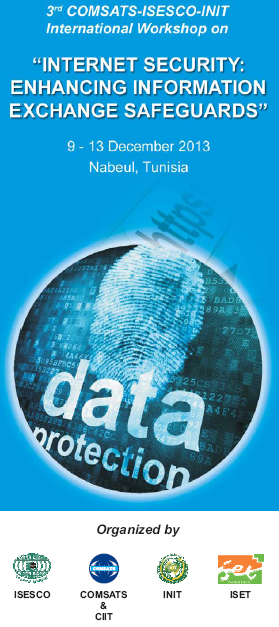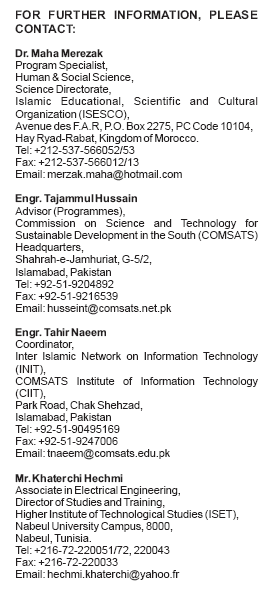|
 Le troisième Workshop international «Sécurité Internet» est organisé conjointement par l'ISESCO; COMSATS; INIT, l'Institut Supérieur des Etudes Technologiques (ISET) de Nabeul, en Tunisie, et l'Institut COMSATS des technologies de l'information (CIIT), Pakistan, du 9 au 13 Décembre 2013, à l’ISET de Nabeul, Tunisie. L'atelier vise à fournir un forum d’échange pour les jeunes scientifiques/chercheurs des pays en développement pour se renseigner sur les dernières avancées dans le domaine de la sécurité Internet, de promouvoir l'utilisation des technologies ultra moderne pour la protection du réseau et des ressources réseau accessibles à partir de différents types d'attaques malveillantes et identifier les solutions efficaces pour les organisations gouvernementales, du grand public et des entreprises commerciales par le biais du risque des analyses rigoureuses et des approches de gestion de la sécurité Le troisième Workshop international «Sécurité Internet» est organisé conjointement par l'ISESCO; COMSATS; INIT, l'Institut Supérieur des Etudes Technologiques (ISET) de Nabeul, en Tunisie, et l'Institut COMSATS des technologies de l'information (CIIT), Pakistan, du 9 au 13 Décembre 2013, à l’ISET de Nabeul, Tunisie. L'atelier vise à fournir un forum d’échange pour les jeunes scientifiques/chercheurs des pays en développement pour se renseigner sur les dernières avancées dans le domaine de la sécurité Internet, de promouvoir l'utilisation des technologies ultra moderne pour la protection du réseau et des ressources réseau accessibles à partir de différents types d'attaques malveillantes et identifier les solutions efficaces pour les organisations gouvernementales, du grand public et des entreprises commerciales par le biais du risque des analyses rigoureuses et des approches de gestion de la sécurité
RESOURCEPERSONS The workshop will be conducted by the following experts: - Dr. Abbas Haider, Research Fellow/Assistant Professor, Center of Excellence in Information Assurance, King Saud University, Saudi Arabia; and Cyber Security Officer/Assistant Professor National University of Sciences & Technology (NUST), Pakistan
- Dr. Malik Najmus Saqib, Assistant Professor, COMSATS Institute of Information Technology (CIIT), Islamabad, Pakistan
- Mr. Zafar Mir, Regional Manager, Information Security Risk, MENA– HSBC, Dubai,UAE iv. Mr. Asad Raza, Lecturer Information Technology (Networking & Security), Majan University College,Oman
BACKGROUND The 21st century saw rapid advancements in IT and telecommunications, particularly computing hardware and software, which resulted in the availability of smaller, inexpensive and more efficient equipment for organizations, businesses and home users.
However, the widespread use of electronic devices and equipment for commercial, social and personal activities over Internet has raised many privacy and security concerns. There is an increasing demand to ensure the security of data transfer services in traditional and emerging Internet-based applications through preventing unauthorized access, misuse, modification or denial of information and information systems. Internet/information
security can be ensured through adopting consistent policies and practices, and taking relevant technical measures.
Realizing the significance of Internet security, the Commission on Science and Technology for Sustainable Development in the South (COMSATS); the Islamic Educational, Scientific and Cultural Organization (ISESCO); and the Inter Islamic Network on Information Technology (INIT) took the initiative of spreading awareness on this
important field in the developing countries, particularly in their Member States, by means of organizing a series of training workshops. The first two events of this series were held in Syria (2011) and Jordan (2012), respectively.  INTRODUCTION INTRODUCTION
The third five-day International Workshop on ‘Internet Security: Enhancing Information Exchange Safeguards’ is being jointly organized by ISESCO; COMSATS; INIT; the Higher Institute of Technological Studies (ISET), Nabeul, Tunisia; and the COMSATS Institute of Information Technology (CIIT), Pakistan, on December 9-13, 2013, in ISET Nabeul,Tunisia. AIMSANDOBJECTIVES The workshop aims to provide a forum to the young scientists/researchers from the developing countries to learn about the latest advancements in the field of Internet security; promote the use of state-of-the-art technologies for protection of network and network-accessible resources from different types of malicious attacks; and identify effective Internet/information security solutions for general public, governmental organizations and commercial ventures through rigorous risk-analyses and security management approaches. FORMAT The workshop includes technical presentations, tutorials and hands-on training sessions by a group of renowned subject experts. It will cover major aspects of Internet/information security, ranging from theoretical understanding of cryptographic algorithms to practical subtleties of the network systems, and will also address the related managerial and technical issues. Moreover, a handful of network security tools will be demonstrated to provide opportunities to the participants to update their knowledge-base and interact with experts for further collaborative undertakings. KEYAREAS Following are the key topics of the workshop:
• Network Security: Modern Attacks, EvasionTechniques and Defenses
• Malicious CodeAnalysis and Detection
• Information Security Risk Assessment/Management
• Measuring Security
• Ethical Issues of ICT Security
• Organizational Security Standards, Policies and Guidelines
• Hardware and Physical Security
• Operating System Security
• Android/Mobile Systems Security
• Cryptographic Techniques for Network Security
• Biometrics Security
• Web Security
• Social Network Security
• Cloud Computing Security TARGETEDINDIVIDUALS Young researchers, practitioners , academicians, executives, system administrators, system programmers, and students working i n the f i e l d o f Internet/information security and cryptography are invited to participate in the workshop. EXPECTEDOUTCOMES The workshop is expected to enable the participants to:
• Understand network protocols, models, topologies and related security threats;
• Understand major modern-day cryptographic algorithms and protocols;
• Use packet sniffing tools, including Wireshark andTcpdump;
• Use Full Disk Encryption (FDE) tools, including TrueCrypt and Microsoft’s BitLocker;
• Understand the anti-virus, anti-spyware tools and firewalls;
• Understand the working of major websecurity applications;
• Setup different web security applications, e.g. Kerberos and SET;
• Understand the working of contemporary biometrics systems;
• Understand organizational security measures, risk assessment tools and techniques and implementing appropriate policies and procedures for a given organization;
• Understand different aspects of cyber security; and
• Understand and use various types of ethical hacking tools to secure the networks, including: network sniffing, spoofing and poisoning; port scanning and vulnerability analysis; offline and online password attacks; buffer overflow; and root-kits and trojans. FINANCIALSUPPORT Partial or full financial support will be provided to selected foreign participants from common
Member States of COMSATS, ISESCO and INIT.
Le troisième Workshop international «Sécurité Internet» |


